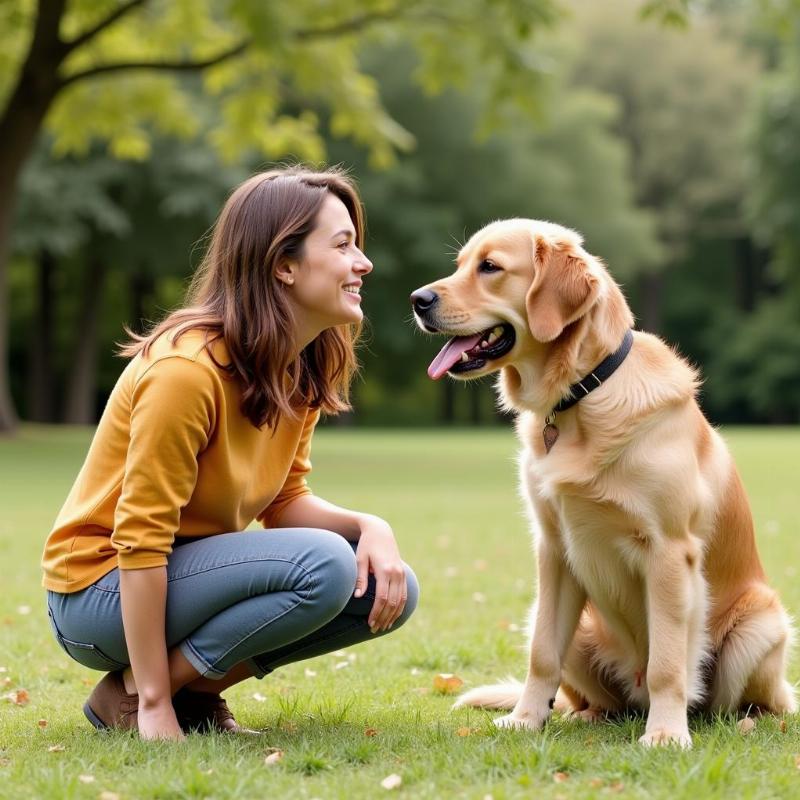Do dogs know their nicknames? It’s a question many dog owners ponder. While Fido may not understand the complexities of human language, there’s fascinating evidence suggesting they can associate certain sounds, especially nicknames, with themselves. This connection isn’t just based on repetition, but rather a deeper understanding of the emotional tone and context surrounding the use of these special names.
Decoding the Canine Mind: How Dogs Process Names
While dogs don’t understand language in the same way humans do, they’re incredibly adept at picking up on cues. Think about it: they learn commands, respond to our emotional states, and even seem to anticipate our routines. This cognitive ability extends to names and nicknames. They learn to associate specific sounds with rewards, attention, and even discipline. This association is built through consistent repetition and reinforcement, much like how they learn basic commands like “sit” or “stay.” But nicknames, often imbued with more emotional inflection, can create an even stronger connection.
The Science Behind Nickname Recognition
Studies have shown that dogs can distinguish between different words and even different intonations. They can recognize their registered name and often even respond to variations of it. This ability to differentiate sounds is what allows them to learn nicknames. Furthermore, the emotional context in which a nickname is used plays a significant role. A nickname used with a happy, loving tone during playtime will elicit a different response than one used with a slightly sterner tone during training. This nuanced understanding of vocal cues is what sets dogs apart and strengthens the bond between humans and their canine companions.
Nicknames vs. Registered Names: Is There a Difference?
While a dog’s registered name is important for official purposes, it’s often the nicknames that hold a special place in the owner’s heart. These nicknames often reflect the dog’s personality, quirks, or even a funny incident. “Buddy,” “Sweet Pea,” or even “Goofball” – these endearing terms carry an emotional weight that strengthens the human-animal bond. do dogs know our names explores how dogs learn our names, which is similar to how they learn nicknames. The frequency and consistency with which these names are used contribute to a dog’s recognition and response.
 Dog owner calling the dog's nickname
Dog owner calling the dog's nickname
Tips for Teaching Your Dog Their Nickname
Want your dog to learn their nickname quickly? Here are some tips:
- Consistency is key: Use the nickname frequently and consistently, especially during positive interactions like playtime, cuddling, or treat time.
- Positive reinforcement: Reward your dog with praise, treats, or a favorite toy when they respond to their nickname.
- Clear pronunciation: Use a clear and distinct tone when saying the nickname.
- Emotional context: Use the nickname with a positive and affectionate tone to create a positive association.
- Avoid confusion: Don’t use too many nicknames at once. Stick to one or two to avoid confusing your furry friend.
Do Dogs Understand the Meaning of Nicknames?
While dogs might not grasp the literal meaning of “Chunky Monkey” or “Wiggle Butt,” they certainly learn the emotional connection associated with those sounds. They understand that these specific sounds directed at them often mean good things – attention, treats, pets, and playtime. This positive association is what makes them perk up their ears and wag their tails when they hear their special name. Understanding the nuances of dog names can also help you choose a meaningful name for your new pup. If you’re looking for unique names for your Boxer, check out our article on unique male boxer dog names.
Conclusion
So, do dogs know their nicknames? While they may not understand the semantic meaning, they certainly recognize the sounds and associate them with positive experiences. The consistent use of nicknames, coupled with positive reinforcement and an affectionate tone, strengthens the bond between dog and owner. This connection is based on a complex interplay of learned associations, vocal cues, and the undeniable power of love and companionship.
FAQ
-
How long does it take for a dog to learn its nickname? It varies, but with consistent use and positive reinforcement, most dogs can learn their nickname within a few weeks.
-
Can I change my dog’s nickname? Yes, you can, but be prepared to re-teach the new nickname using the same techniques.
-
Is it important to use my dog’s registered name sometimes? Yes, it’s good to use their registered name occasionally, especially for important commands or in situations where clarity is needed.
-
Should I use different nicknames for different situations? It’s best to stick with one or two nicknames to avoid confusion.
-
What if my dog doesn’t seem to respond to its nickname? Ensure you are using positive reinforcement, clear pronunciation, and consistency. If the problem persists, consult a professional dog trainer.
-
Can a nickname be too long? Shorter nicknames are generally easier for dogs to learn, but longer ones can work if used consistently.
-
Can I use a human name as a nickname for my dog? Yes, you can! Just be prepared for potential confusion if you also know a person with the same name.
Beautdogs.us is your premier resource for all things dog-related in the USA. We offer expert advice on dog breeds, care, and products, providing a trusted source of information for both new and experienced dog owners. From understanding if do dogs know their nicknames to finding the perfect four letter dog names male, or even understanding the meaning of roxy dog name, Beautdogs.us is your one-stop shop. Connect with us for personalized support at [email protected] or call us at +1 501-555-7529. Visit Beautdogs.us today to learn more!